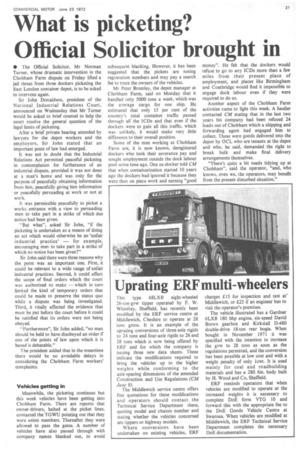What is picketing?
Page 23

If you've noticed an error in this article please click here to report it so we can fix it.
Official Solicitor brought in
• The Official Solicitor, Mr Norman Turner, whose dramatic intervention in the Chobham Farm dispute on Friday lifted a jail threat from three dockers picketing the East London container depot, is to be asked to intervene again.
Sir John Donaldson, president of the National Industrial Relations Court, announced on Wednesday that Mr Turner would be asked to brief counsel to help the court resolve the general question of the legal limits of picketing.
After a brief private hearing attended by lawyers for the depot workers and the employers, Sir John stated that an important point of law had emerged.
It was not in doubt that the Industrial Relations Act permitted peaceful picketing in contemplation for furtherance of an industrial dispute, provided it was not done at a man's home and was only for the purpose of peacefully obtaining information from him, peacefully giving him information or peacefully persuading at work or not at work.
It was permissible peacefully to picket a works entrance with a view to persuading men to take part in a strike of which due notice had been given.
But what", asked Sir John, "if the picketing is undertaken as a means of doing an act which would otherwise be an 'unfair industrial practice' — for example, encouraging men to take part in a strike of which no notice has been given?"
Sir John said there were three reasons why the point was an important one. First, it could be relevant to a wide range of unfair industrial practices. Second, it could affect the scope of final orders which the court was authorized to make — which in turn limited the kind of temporary orders that could be made to preserve the status quo while a dispute was being investigated. Third, it vitally affected the evidence that must be put before the court before it could be satisfied that its orders were not being obeyed.
-Furthermore", Sir John added, "no man should be held to have disobeyed an order if one of the points of law upon which it is based is debatable."
The president added that in the meantime there would be no avoidable delays in considering the Chobham Farm workers' complaints.
Vehicles getting in Meanwhile, the picketing continues but this week vehicles have been getting into Chobham Farm. There are reports that owner-drivers, halted at the picket lines, contacted the TGWU pointing out that they were union members. Thereafter they were allowed to pass the gates. A number of vehicles have also passed through with company names blanked out, to avoid subsequent blacking. However, it has been suggested that the pickets are noting registration numbers and may pay a search fee to trace the owners of the vehicles.
Mr Peter Bromley, the depot manager at Chohham Farm, said on Monday that it handled only 5000 tons a week, which was the average cargo for one ship. He estimated that only 15 per cent of the country's total container traffic passed through all the ICDs and that even if the dockers were to gain all this traffic, which was unlikely, it would make very little difference to their overall position.
Some of the men working at Chobham Farm are, it is now known, deregistered dockers who took their severance pay and sought employment outside the dock labour pool some time ago. One ex-docker told CM that when containerization started 10 years ago the dockers had ignored it because they were then on piece work and earning "good money". He felt that the dockers would refuse to go to any ICDs more than a few miles from their present place of employment, and places like Birmingham and Coatbridge would find it impossible to engage dock labour even if they were required to do so.
Another aspect of the Chobham Farm activities came to light this week. A haulier contacted CM stating that in the last two years his company had been refused 24 loads out of Chobham which a shipping and forwarding agent had engaged him to collect. These were goods delivered into the depot by OCL who are tenants at the depot and who, he said, demanded the right to break bulk and make final delivery arrangements themselves.
"There's quite a bit needs tidying up at Chobham", said the operator, "and, who knows, even we, the operators, may benefit from the present disturbed situation."












































































































